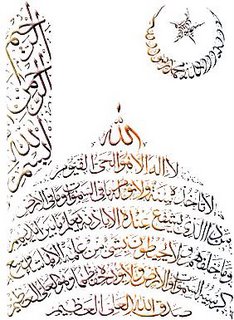Adil Najam
 Today is the 10th of Muharram. Ashura.
Today is the 10th of Muharram. Ashura.
It commemorates a struggle that is steeped in deep spiritual meaning, not only for Islamic history but for all humanity. It is a struggle between good and evil, between just and unjust, between weak and powerful, between immediate and the eternal, between principle and ambition. The power of Ashura is not only in the epic events that it commemorates, it is in the narrative of those events, in the symbolisms that we construct. Ultimately, it is in the meanings that we derive from those events.
Muharram is, of course, of special significance to Shias. But the events and meaning of Ashura is of significance and relevance to all Muslims, and I would suggest, to all humans everywhere.
![]()
Like so many others growing up in a Sunni household I grew up observing ehteram-i-Muharram and am always drawn in the days leading up to Ashura towards thinking about the meaning of religion and of faith. To me these have always been days of deep spiritual reflection; especially of intellectual enquiry into the meaning of justice (the concept of ‘adl’ holds a deep significance to me given the name I was given at birth and therefore I have always interpreted Ashura particularly as a time to reflect on what justice is).
Growing up in Pakistan, the night of Ashura was always defined for me by the Majlis i Shaam i Gharibaan (often by Allama Naseer ul Ijtihaadi) on PTV on the night of dasveen Muharram, which was followed immediately – and at right about midnight – by Syed Nasir Jahan’s soulful recitation of Salam-i-Akhir.
Bachay to aglay baras hum hain aur yeh gham phir hai
Jo chal basay tou yeh appna salam-i-akhir hai
His soulful voice, so pregnant with a deep and heartfelt pain, always echoes in my head when I read of continuing sectarian violence and the instigation of sectarian hatred.
Also echoing in my head are memories of the eloquent narratives of those PTV Shaam i Gharibaan’s. What I took from my yearly ritual of sitting glued to the screen was that the message of Ashura, of Karbala, is a universal and humanist messages. Justice is a universal message. Courage is a universal message. Conviction is a universal message. Sacrifice is a universal message.
It is the universality of the messages of Ashura that I hope we will all reflect upon. Every one of these messages is literally torn asunder each Muharram when the merchants of sectarianism highjack these commemorations with their vitriolic politics of fear, of difference, of hatred.
While these are universal messages, they are also – as they must be – messages of Pakistaniat. Yasser Hamdani sent me this quote from Mohammad Ali Jinnah published in a souvenir commemorating the 1300th anniversay of Imam Hussain’s shahadat.
There cannot be a better and more illustrious example than that of Husein who was the greatest embodiment of courage, conviction and sacrifice and every Mussalman in particular should take the great example of his life and service and follow it.
Jinnah was right. He would probably be pained to see how not only his own message, but that of Imam Hussain’s life -and death – have been so very lost on so many of his countrymen today.




















































Mr Bhatti..’you may call me a kafir?’….what does that mean. And please, don’t call it Celebration. Muharram is observed, not celebrated.
I am a Sunni but I believe the message of Karbala is for the entire humanity. We are nobody to judge each other’s faith and depth of his belief, so don’t be apologetic from the beginning.
Now coming to Muharram, living in a Muslim country you may never understand what Muharram is. In countries like India, where Muslims are a minority, it was Muharram that took the spirit of sacrifice to non-Muslims and for centuries Hindus observed it along with Muslims. It involved people of all cross-setions like the making of tazias that brought carpenters, artists and other artisans together. Thus they came closer to Muslims, learnt about Islam and millions got converted over the centuries. This is the social aspect.
As far as the message of the battle of Karbala is concerned, everybody will get inspired by such supreme sacrifice. Practices evolve over the ages and as far as terming ‘bidah’ is concerned, I think there is no limit.
Here a nice video Marsiya by a revolutionary poet of the subcontinent Late Josh Malihahabadi in his own voice.
Josh ka kalam sun kay tu waqai josh aa jai.
[quote post=”550″]http://www.youtube.com/watch?v=JUsnl4sE U3s[/quote]
Folks, I am haunted by real poetry on this topic. There are times when I fully understand why Mir Anees took up marsia fully knowing that he had it in him to be grouped with the greatest of the traditional poetry (Mir and Ghalib). And once you open his book there really is no end to it; you go on and on and start all over. Akhtar Husein Jaffrey wrote and I quote from my memory:
iss maheenay ki tishna lab saa’aatein
bain kartee hein dehleez purr
aur zanjeer-e-dar mujh se khulti nahee
farsh-e-hamwaar purr paa’oan chalta nahee
dill dharakta nahee
iss maheenay mein ghar se nikalta nahee.
Other than their religious significance the events of Karbala have given a whole lot of imagery and metaphors to Urdu poetry, sometime obvious and sometime implied. Faiz’s “aaj bazaar maiN pa ba jolaaN chalo” comes to mind immediately. Without Karbala Urdu poetry would have been a lot poorer.
Adnan, whose lines are those? They are beautiful.
Another verse from Iftikhar Arif, that contemporizes the message of Ahura in a contemporary contxt: